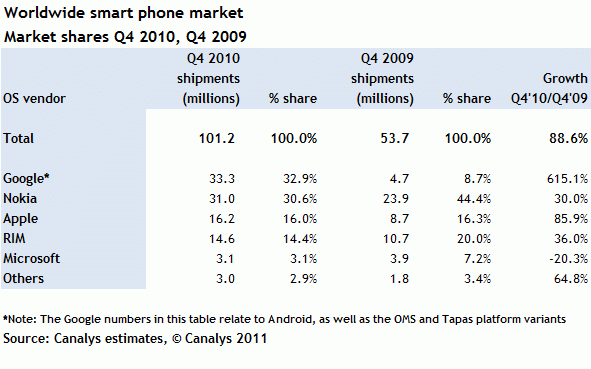Q4 2010 saw the worldwide smartphone market continue to soar, with shipments of 101.2 million units representing year-on-year growth of 89 percent. Shipments for the year were just below 300 million units, with an annual growth rate of 80 percent compared to 2009, according to Canalys.
Google's Android has become the leading platform, thanks to shipments of Android-based smartphones reaching 32.9 million. Nokia's Symbian platform trailed slightly at 31.0 million worldwide. The Finish company did, however, manage to retain its position as the leading global smartphone vendor, with a share of 28 percent.

In Q4 2010, volumes of Google OS-based smart phones (Android, OMS, and Tapas) were again boosted by strong performances from a number of vendors. HTC and Samsung alone accounted for nearly 45 percent of Google OS-based handset shipments.
In the US, RIM recaptured first place from Apple: the latter experienced its usual seasonal dip while the former benefited from the first full quarter of shipments for the BlackBerry Torch. HTC successfully maintained its third-place ranking in the US for the third consecutive quarter. Android was by far the largest smartphone platform in Q4 2010, with shipments of 12.1 million units – nearly three times those of RIM's BlackBerry devices. Windows Phone 7 devices appeared too late in the quarter to take full advantage of holiday season purchasing, and Microsoft lost share.
"2010 has been a fantastic year for the smart phone market," Chris Jones, Canalys VP and Principal Analyst, said in a statement. "After a difficult 2009, the speed with which the market has recovered has required real commitment and innovation from vendors and they have risen to the challenge. But vendors cannot afford to be complacent. 2011 is set to be a highly competitive year with vendors looking to use new technology, such as dual-core processors, NFC and 3D displays, to differentiate their products and maintain value."
https://www.techspot.com/news/42219-google-passed-nokia-in-q4-2010-market-share.html